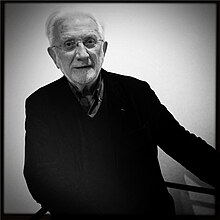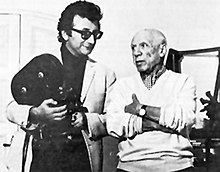Lucien Clergue

Lucien Clergue (born August 14, 1934 in Arles , † November 15, 2014 in Nîmes ) was a French photographer, author and filmmaker. He was known for his object photography and for female nudes, and also through Picasso , who recognized him as one of the first to recognize him as an artist , while such photos (if the face of the person depicted could also be recognized) were considered pornography in France at that time and therefore illegal were.
Life
Lucien Clergue was born in Arles in 1934 as the son of small shop owners. His parents let him learn to play the violin from childhood. Lucien was gifted, but his parents didn't have the money to enable him to study at the conservatory. However, Lucien discovered photography for himself and his early work shows an excellent understanding of the medium.
In 1953 he met Pablo Picasso at a bullfight and showed him some pictures. Picasso encouraged him to send him more photographs. Encouraged, Lucien worked on several photo cycles, including a cycle about gypsies in the south of France ("Saltimbanques"), which later helped the guitarist Manitas de Plata on his way to international acquaintance. In 1955 there was a second personal meeting, where Lucien Clergue and Pablo Picasso also became friends. This friendship, which lasted until Picasso's death, was later documented by Clergue in the book "Picasso mon ami" (Paris, 1993). Clergue also took several portrait photographs of Picasso.
In 1968 he and his friend Michel Tournier founded the annual photography festival Rencontres Internationales de la Photographie , which is held in Arles in July and has since developed into one of the largest and most influential events in Europe.
His work found more and more recognition. Orders for magazines and illustrations for books, such as those of the writer Yves Navarre, followed. In 1979 he obtained his doctorate from the University of Provence in Marseille.
Clergue successfully fought for the recognition of photography as an art in France. On May 28, 1965, Lucien Clergue and Jean-Maurice Rouquette opened the first section devoted solely to photography in the French Art Museum in Arles, to which many well-known photographers donated works because of their friendship with Clergue and Rouquette.
In old age there were also numerous honors for his life's work. In 2003, Lucien Clergue became a knight of the Légion d'honneur and in 2006 became the first photographer to be a member of the French Académie des Beaux-Arts , of which he became president for 2013.
Lucien Clergue lived and worked in Arles.
Act
The themes of his early works are the female body and bullfighting, and later he devoted himself to fragment photography. Technically, his work was greatly influenced by the new dissolve and Polaroid technology.
Lucien Clergue was valued as an artist by both Pablo Picasso and Jean Cocteau . Picasso was already convinced of Clergue's artistic talent in the 1950s. He compared the composition and approach with that of the painters Manet or Renoir .
For Cocteau, Clergue documented the shooting of Das Testament des Orpheus / Le Testament d'Orphée (1960) and published it in 2001 as an illustrated book (L. Clergue, Jean Cocteau and the Testament of Orpheus: The Photographs, 2001). Cocteau also gave the apt description that should come up so often in connection with Clergue's works: the poet with a camera .
Awards
- 2003 Chevalier of the Légion d'honneur
- 2006 Member of the French Académie des Beaux-Arts (seat as the first photographer)
Works
- L. Clergue, Poetry of Photography, Cologne 1960, 62 pp.
- L. Clergue and J. Cocteau, Lucien Clergue - photographe, Zurich 1964, 95 pp.
- L. Clergue and J. Boissieu, Provence and Camargue, Vienna a. a. 1984, 111 pp.
- L. Clergue, Saint-John Perse - poète devant la mer, Biarritz u. a. 1996, 96 pp.
- P. Picasso and L. Clergue, Picasso mon ami, Paris 1993, 207 pp.
- L. Clergue, Arena - signes des sables, Arles 2001, 140 pp.
- L. Clergue and DL Sweet, Jean Cocteau and The Testament of Orpheus - the photographs, New York, NY u. a. 2001, 144 pp.
- L. Clergue and E.-M. Turck, Poésie photographique, Munich / Berlin / London / New York 2003, 143 pp. '
- Lucien Clergue: Brasília - The architect Oscar Niemeyer and the photographer Lucien Clergue. The erotomaniac of the curve. Hatje Cantz Verlag, Ostfildern 2013, in German, ISBN 978-3-7757-3550-6 ; in English, ISBN 978-3-7757-3313-7 .
Web links
- Literature by and about Lucien Clergue in the catalog of the German National Library
- Lucien Clergue in the Internet Movie Database (English)
- Biography 1 & * Biography 2 of Lucien Clergue
- Kunsthaus Wien - description of the exhibition
- Photographs
- Museo Cantonale d'Arte, Lugano: Fontaines du Grand Palais
- Entry on the website of the Académie des Beaux-Arts
Individual evidence
- ↑ French photographer and Picasso confidant dies aged 80 , expatica.com, November 15, 2014, accessed November 16, 2014
- ^ Obituary for Lucien Clergue in: Le Monde
| personal data | |
|---|---|
| SURNAME | Clergue, Lucien |
| BRIEF DESCRIPTION | French photographer |
| DATE OF BIRTH | August 14, 1934 |
| PLACE OF BIRTH | Arles , France |
| DATE OF DEATH | 15th November 2014 |
| Place of death | Nîmes , France |

